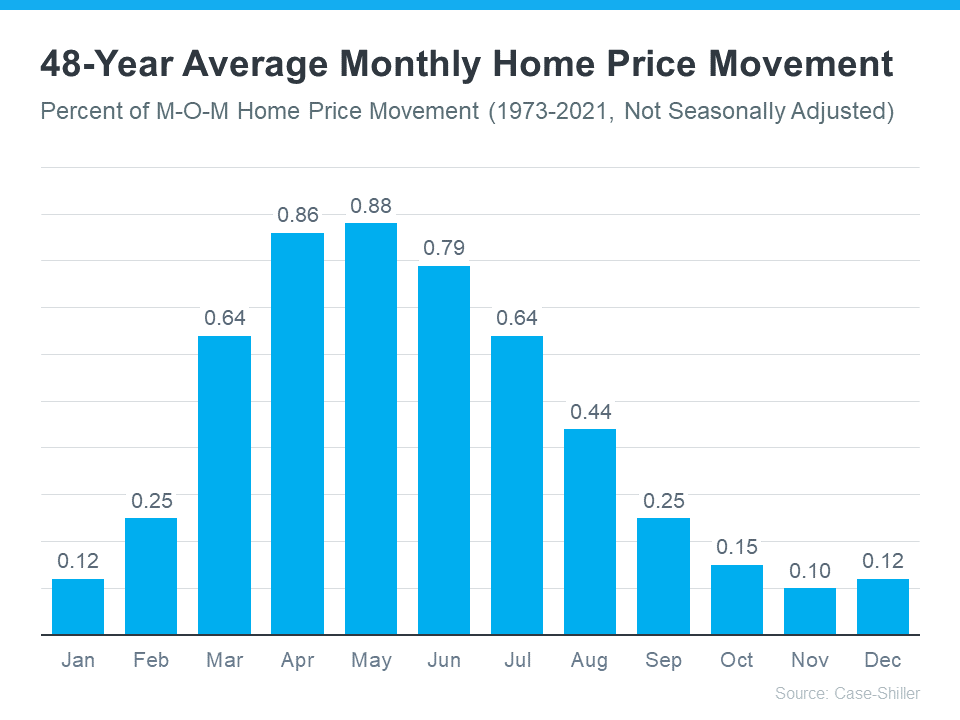
“What’s really happening with home prices?”
If you’re thinking of buying or selling a home, one of the biggest questions you have right now is probably: what’s happening with home prices? And it’s no surprise you don’t have the clarity you need on that topic. Part of the issue is how headlines are talking about prices.
They’re basing their negative news by comparing current stats to the last few years. But you can’t compare this year to the ‘unicorn’ years (when home prices reached record highs that were unsustainable). And as prices begin to normalize now, they’re talking about it like it’s a bad thing and making people fear what’s next. But the worst home price declines are already behind us. What we’re starting to see now is the return to more normal home price appreciation.
To help make home price trends easier to understand, let’s focus on what’s typical for the market and omit the last few years since they were anomalies.
Let’s start by talking about seasonality in real estate. In the housing market, there are predictable ebbs and flows that happen each year. Spring is the peak homebuying season when the market is most active. That activity is typically still strong in the summer but begins to wane as the cooler months approach. Home prices follow along with seasonality because prices appreciate most when something is in high demand.
That’s why, before the abnormal years we just experienced, there was a reliable long-term home price trend. The graph below uses data from Case-Shiller to show typical monthly home price movement from 1973 through 2021 (not adjusted, so you can see the seasonality):
As the data from the last 48 years shows, at the beginning of the year, home prices grow, but not as much as they do entering the spring and summer markets. That’s because the market is less active in January and February since fewer people move in the cooler months. As the market transitions into the peak homebuying season in the spring, activity ramps up, and home prices go up a lot more in response. Then, as fall and winter approach, activity eases again. Price growth slows, but still typically appreciates.
Why This Is So Important to Understand
In the coming months, as the housing market moves further into a more predictable seasonal rhythm, you’re going to see even more headlines that either get what’s happening with home prices wrong or, at the very least, are misleading. Those headlines might use a number of price terms, like:
- Appreciation: when prices increase.
- Deceleration of appreciation: when prices continue to appreciate, but at a slower or more moderate pace.
- Depreciation: when prices decrease.
They’re going to mistake the slowing home price growth (deceleration of appreciation) that’s typical of market seasonality in the fall and winter and think prices are falling (depreciation). Don’t let those headlines confuse you or spark fear. Instead, remember it’s normal to see a deceleration of appreciation, slowing home price growth, as the months go by.
Bottom Line
If you have questions about what’s happening with home prices in our local area, let’s connect.
To view original article, visit Keeping Current Matters.
Why Home Sales Bounce Back After Presidential Elections
As has been the case before, once the election uncertainty passes, buyers and sellers will return to the market.
Why Your House Will Shine in Today’s Market
If you’re thinking about selling, the shortage of homes for sale means your house is likely to get some serious attention from buyers.
How Long Will It Take to Sell Your House?
If you’re looking for ways to make your move happen as quickly as possible, partnering with a great local agent is the key.
Planning To Sell Your House in 2025? Start Prepping Now
By starting your prep work early, you’ll give yourself plenty of time to get your house market-ready by the end of the year.
What To Expect from Mortgage Rates and Home Prices in 2025
With home prices projected to rise at a more moderate pace, 2025 is shaping up to be a more promising year for both buyers and sellers.
Why Did More People Decide To Sell Their Homes Recently?
As rates came down at the end of the summer, more people jumped into the market and decided to make their move.






